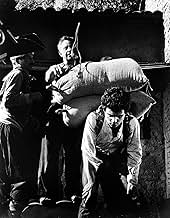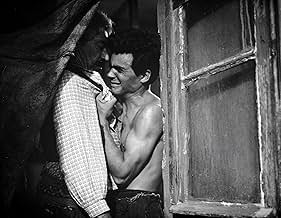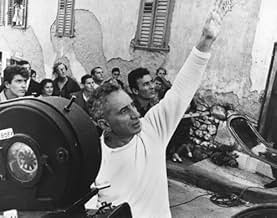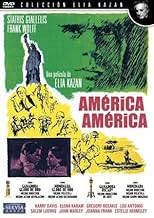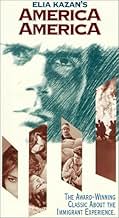IMDb RATING
7.7/10
6.3K
YOUR RATING
A young Greek stops at nothing to secure a passage to America.A young Greek stops at nothing to secure a passage to America.A young Greek stops at nothing to secure a passage to America.
- Won 1 Oscar
- 7 wins & 12 nominations total
Garrett Cassell
- Dog Walker
- (uncredited)
Tom Holland
- Voice Overs
- (voice)
- (uncredited)
Elia Kazan
- Self
- (voice)
- (uncredited)
- Director
- Writer
- All cast & crew
- Production, box office & more at IMDbPro
Featured reviews
"America, America" is a movie made with the soul. It is a hair-raising movie about the immigrant experience, made by artists temporarily outside the Hollywood cage. It is about the struggle to be human in a world that bites at you, and it is about naked desire. "America, America" is a film about a young man with ichor in his arteries, made by people with ichor in their arteries.
Stavros is a young Greek from Anatolia, a youth with burning eyes, full of ethos as well. He yearns to live a life away from degradation (Greeks in Anatolia were a despised minority). This movie shows his peregrination to America, in three of the shortest hours I've ever lived. It shows a cycle of being broken and rebuilt over and again, the death of illusions, the obduracy of hope, and the rack of desire.
Haskell Wexler deserves special mention as he quite frequently produced jaw-dropping shots in this movie. There is a scene in this movie where Stavros is sat next to an older woman, Sophia (sat together like panthers watching an ape play with jackals), and the electricity between them, established entirely visually, is a devastation.
The editing from Dede Allen, is similarly special, and you can see that Kazan acknowledged all this creative talent as he reads out all the names of the major creative staff at the end over the credits. One particularly beautiful effect was a dissolve the last time we see Stavros' mother, where her face persist on the screen for a moment, almost as if she has become a ghost.
You absolutely must see this movie.
Stavros is a young Greek from Anatolia, a youth with burning eyes, full of ethos as well. He yearns to live a life away from degradation (Greeks in Anatolia were a despised minority). This movie shows his peregrination to America, in three of the shortest hours I've ever lived. It shows a cycle of being broken and rebuilt over and again, the death of illusions, the obduracy of hope, and the rack of desire.
Haskell Wexler deserves special mention as he quite frequently produced jaw-dropping shots in this movie. There is a scene in this movie where Stavros is sat next to an older woman, Sophia (sat together like panthers watching an ape play with jackals), and the electricity between them, established entirely visually, is a devastation.
The editing from Dede Allen, is similarly special, and you can see that Kazan acknowledged all this creative talent as he reads out all the names of the major creative staff at the end over the credits. One particularly beautiful effect was a dissolve the last time we see Stavros' mother, where her face persist on the screen for a moment, almost as if she has become a ghost.
You absolutely must see this movie.
Imagine a film like "The Godfather" receiving almost no audience, relegated to the occasional appearance on the AMC channel, barely being released on VHS or DVD, and you will have some idea of the tragic fate of this lost epic masterpiece. As hard as it is to believe, this may be the prolific director Elia Kazan's greatest film achievement, yet hardly anyone has seen it. This is a film on the epic scale of "The Godfather," about a young Armenian man's escape from Turkish persecution, flight from Anatolia, and eventual immigration to Ellis Island - all based upon the the experiences of the director's uncle. What is also tragic is the fact that I can think of no other film which portrays the cruel persecution and genocide inflicted upon the Armenian minority by the Ottoman Turks in the early 20th century (which Hitler correctly pointed to as proof that the world would look the other way at the genocide he had planned in Europe in the 1930s). Every period detail in the film is perfect, from the Oscar-winning costume design to the set design, Greek folk music score, veteran Haskell Wexler's cinematography, and acting - especially lead actor Giallelis, whose intensity brings to mind some of Brando's early work.
It is obvious that this film was a very personal piece of film-making for Kazan. And though I don't want to dwell as others do on Kazan's checkered past in his naming of communist colleagues for HUAC in the 1950s, it is interesting to note a parallel in the main character Stavros' personal anguish in making the choice to leave his wealthy wife and use her money to immigrate to the United States; both men made the conscious decision to drive a wedge between them and their past relationships. This is truly a film for all Americans to treasure, and if I had my way, I would make sure it was broadcast every 4th of July just as "It's a Wonderful Life" is broadcast every Christmas. As a nation of immigrants and descendants of immigrants, this is a film virtually every American can relate to. I can't figure out why it is so obscure.
It is obvious that this film was a very personal piece of film-making for Kazan. And though I don't want to dwell as others do on Kazan's checkered past in his naming of communist colleagues for HUAC in the 1950s, it is interesting to note a parallel in the main character Stavros' personal anguish in making the choice to leave his wealthy wife and use her money to immigrate to the United States; both men made the conscious decision to drive a wedge between them and their past relationships. This is truly a film for all Americans to treasure, and if I had my way, I would make sure it was broadcast every 4th of July just as "It's a Wonderful Life" is broadcast every Christmas. As a nation of immigrants and descendants of immigrants, this is a film virtually every American can relate to. I can't figure out why it is so obscure.
"America, America" deserves a modern audience but is almost impossible to find. I just viewed a VHS version obtained through the inter-library loan program. I live in Virginia and it was sent down from Alaska!
This film should be required viewing for anyone interested in understanding why the huddled masses flocked to America but it is highly personalized and focused on a young man from a middle class Greek family with a big dream that seems impossible to fulfill. Another reviewer correctly likened Stathis Giallelis to a young Brando for his overpowering individuality, determination, and (for Turkish society in 1900) swagger. But when his character Stavros grows a mustache, he becomes a young Omar Sharif. AA is brilliantly written and directed by Elia Kazan.
This film should be required viewing for anyone interested in understanding why the huddled masses flocked to America but it is highly personalized and focused on a young man from a middle class Greek family with a big dream that seems impossible to fulfill. Another reviewer correctly likened Stathis Giallelis to a young Brando for his overpowering individuality, determination, and (for Turkish society in 1900) swagger. But when his character Stavros grows a mustache, he becomes a young Omar Sharif. AA is brilliantly written and directed by Elia Kazan.
Kazan's reputation seems to have been diminishing for some time, a process, ironically, that his 'Lifetime Achievement' Oscar seems to have accelerated. Yeah, he did betray his fellows and himself in the 1950s. Again, ironically, it's the films he made later in his career, which show the scars of his loss of self-esteem, which are the most fascinating - WILD RIVER, SPLENDOR IN THE GRASS, THE ARRANGEMENT - and most powerful of them all, AMERICA AMERICA.
I too am surprised that this monument to Americanism and monument of American cinema, seems not very widely known in America itself. It has all the values of classic American cinema - a strong, simple narrative, a limpid visual style which eschews any directorial histrionics to concentrate purely on the characters. It is the story of young men driven from their homeland and making the long voyage to America - the huddled masses yearning to be free. The journey is long and terribly hard, and even as the shore of American comes into view, sacrifices still have to be made. The end of the film is enormously powerful, one of the most moving I have ever seen - the effect is still with me now, 30 years after seeing it.
It is the story of Kazan's father and uncle - the character who makes an appearance, played by Richard Boone, in Kazan's more heavily fictionalised subsequent film THE ARRANGEMENT. It is a personal story, and the simplicity of the telling seems like the end of a process of endless re-telling around smokey fireplaces, and before children go to sleep, a family saga which has almost attained the status of myth. The savagery of the film's first hour, and the dream-like quality of the last act make AMERICA AMERICA a genuine and powerful part of American mythology.
So don't torture yourself about whether Kazan was morally and politically wrong in betraying his colleagues - see AMERICA AMERICA, and you'll see why he could never have acted any differently. Yes, he was a radical, and a leftist, and a deeply intelligent and passionate man; but he was also an immigrant - and his horror of disenfranchisement and ejection overcame his moral and political views. Kazan may criticise aspects of its culture and politics, but he loves and respects and is grateful to America above all. So he made his choice. He could have made no other.
I too am surprised that this monument to Americanism and monument of American cinema, seems not very widely known in America itself. It has all the values of classic American cinema - a strong, simple narrative, a limpid visual style which eschews any directorial histrionics to concentrate purely on the characters. It is the story of young men driven from their homeland and making the long voyage to America - the huddled masses yearning to be free. The journey is long and terribly hard, and even as the shore of American comes into view, sacrifices still have to be made. The end of the film is enormously powerful, one of the most moving I have ever seen - the effect is still with me now, 30 years after seeing it.
It is the story of Kazan's father and uncle - the character who makes an appearance, played by Richard Boone, in Kazan's more heavily fictionalised subsequent film THE ARRANGEMENT. It is a personal story, and the simplicity of the telling seems like the end of a process of endless re-telling around smokey fireplaces, and before children go to sleep, a family saga which has almost attained the status of myth. The savagery of the film's first hour, and the dream-like quality of the last act make AMERICA AMERICA a genuine and powerful part of American mythology.
So don't torture yourself about whether Kazan was morally and politically wrong in betraying his colleagues - see AMERICA AMERICA, and you'll see why he could never have acted any differently. Yes, he was a radical, and a leftist, and a deeply intelligent and passionate man; but he was also an immigrant - and his horror of disenfranchisement and ejection overcame his moral and political views. Kazan may criticise aspects of its culture and politics, but he loves and respects and is grateful to America above all. So he made his choice. He could have made no other.
While I am not sure I'd consider this to be Elia Kazan's best film, it certainly ranks up there with his best--which is saying a lot considering he's the same guy who brought us "On The Waterfront", "A Streetcar Named Desire" and "Rebel Without a Cause". As for Kazan himself, this was his favorite film as it's the story of his uncle--a man who busted his butt to get himself to America around the turn of the century.
When the movie begins, Kazan himself narrates and explains that the story is about the man who is responsible for him and his family immigrating to the US. His story begins in Turkey. It's around the time in history when the Turks were about to wipe out most of the Armenians--and things for other minorities in their land (in this case, the Greeks) weren't very good either. So, a family decides to send their oldest son, Stavros (Stathis Giallelis), to Constantiople to earn his fortune--and to be able to afford to eventually bring them all to America...and freedom. Stavros is a very, very determined man...but also quite naive. Again and again, he's used by people and left with nothing. But, he's an amazingly resilient guy and soon he's willing to do just about anything to make the money he needs to take the ship to America.
While the story is rather simple, it's handled exquisitely. You can really tell that it's a labor of love, as the story unfolds very slowly and patiently. This is NOT a complaint-just a statement about the writer/director's style in the movie. It's really great what he was able to achieve with mostly inexperienced actors and non-actors. Perhaps Giallelis' performance is a bit too quiet and even stilted...but it is hard to imagine that he wasn't even an actor! Overall, it's a beautiful tale--and one of the most American of movies because it tells a story of immigration that most of us in the US can relate to. Even though my family was not Greek, so much of the rest of the film is pretty typical of what other poor families like my own probably went through on their way to a new land. Well worth seeing and a nice history lesson.
When the movie begins, Kazan himself narrates and explains that the story is about the man who is responsible for him and his family immigrating to the US. His story begins in Turkey. It's around the time in history when the Turks were about to wipe out most of the Armenians--and things for other minorities in their land (in this case, the Greeks) weren't very good either. So, a family decides to send their oldest son, Stavros (Stathis Giallelis), to Constantiople to earn his fortune--and to be able to afford to eventually bring them all to America...and freedom. Stavros is a very, very determined man...but also quite naive. Again and again, he's used by people and left with nothing. But, he's an amazingly resilient guy and soon he's willing to do just about anything to make the money he needs to take the ship to America.
While the story is rather simple, it's handled exquisitely. You can really tell that it's a labor of love, as the story unfolds very slowly and patiently. This is NOT a complaint-just a statement about the writer/director's style in the movie. It's really great what he was able to achieve with mostly inexperienced actors and non-actors. Perhaps Giallelis' performance is a bit too quiet and even stilted...but it is hard to imagine that he wasn't even an actor! Overall, it's a beautiful tale--and one of the most American of movies because it tells a story of immigration that most of us in the US can relate to. Even though my family was not Greek, so much of the rest of the film is pretty typical of what other poor families like my own probably went through on their way to a new land. Well worth seeing and a nice history lesson.
Did you know
- TriviaOf all the films he had directed, this one was Elia Kazan's favorite film, as it was very personal to him.
- GoofsAn old woman is humming a tune from Astor Piazzolla's Libertango in the 1900s, decades before the composer was even born.
- Quotes
Elia Kazan: [Voice- over] My name is Elia Kazan. I am a Greek by blood, a Turk by birth and an American because my uncle made a journey.
- Crazy creditsDirector Elia Kazan narrates the main portion of the closing credits, reading the words as they appear on the screen, using complete sentences such as "The cinematography was by Haskell Wexler."
- ConnectionsEdited into Grand format: Amérique, notre histoire (2006)
- SoundtracksExcitement In The Village
- How long is America America?Powered by Alexa
Details
- Runtime
- 2h 54m(174 min)
- Color
- Aspect ratio
- 1.85 : 1
Contribute to this page
Suggest an edit or add missing content







